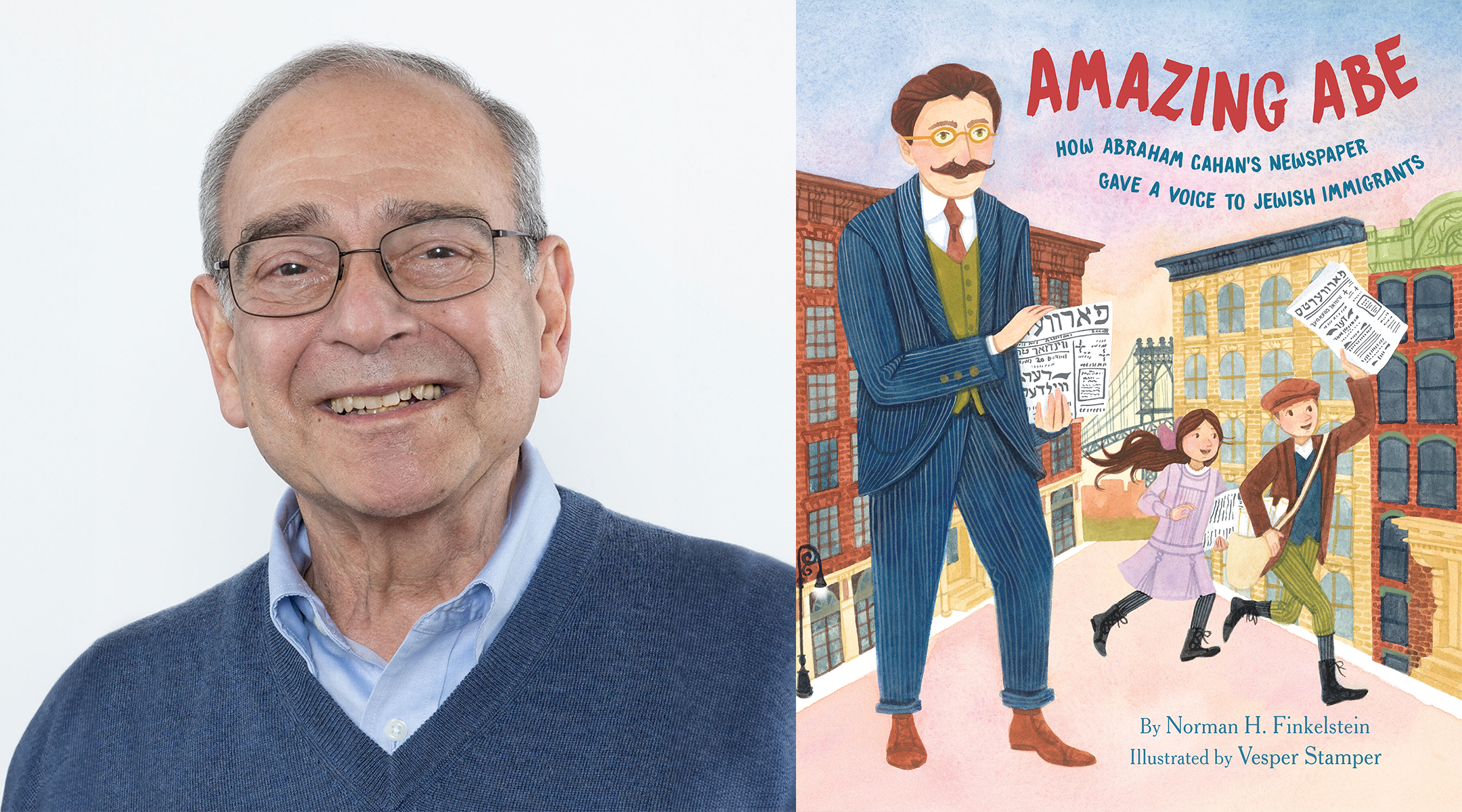Boston writer Norm Finkelstein, whose YA books championed Jewish heroes, dies at 82
The Boston educator and author would joke about sharing a name with one of the most vociferous critics of Israel

Norm Finkelstein was the author more than 20 nonfiction books for children and teens, including a forthcoming biography of the legendary Forward editor Ab. Cahan. (Courtesy; Holiday House)
BOSTON (JTA) — In the early 1980s, when Norman H. Finkelstein was the director of education at Camp Yavne in Northwood, New Hampshire, campers would greet his daily announcements by exuberantly chanting, “Norm, Norm!,” a reference to a popular character on the hit television series “Cheers.”
The warm reception at the Jewish summer camp reflected Finkelstein’s fun and lively personality, according to his oldest son, Jeffrey.
“He was an educator. But even in summer camp, when the kids are not there to learn, but to have fun, he made it fun,” Jeffrey, president and CEO of the Jewish Federation of Greater Pittsburgh, told the Jewish Telegraphic Agency.
At the time, Finkelstein was a librarian in the Brookline Public Schools, a career that lasted 35 years. He and his wife, Rosalind, had joined the camp’s summer staff so they could afford to send their three kids to the camp. In addition, he was a teacher at Hebrew College’s Prozdor Hebrew high school for nearly 40 years.
But it was another role that brought him acclaim in Boston and beyond: Finkelstein was an acclaimed author of nonfiction books and biographies for older children, including many on Jewish subjects. He was a rare, two-time winner of the coveted National Jewish Book award, for “Heeding the Call: Jewish Voices in America’s Civil Rights Struggle” and “Forged in Freedom: Shaping the American Jewish Experience.”
He was also the recipient of the Golden Kite honor award for nonfiction for his 1997 YA biography of newsman Edward R. Murrow.
“His incredible books championed the vital contributions of Jewish Americans, immigrants, and workers to U.S. history and culture,” Della Farrell, associate editor of the publisher Holiday House, wrote in an email.
Finkelstein, 82, died on Friday, Jan. 5 from what his family said was an unexpected illness. Holiday House is publishing one of two books that Finkelstein was looking forward to seeing in print at the time of his death: “Amazing Abe: How Abraham Cahan’s Newspaper Gave a Voice to Jewish Immigrants,” a biography of the legendary Yiddish Forward editor illustrated by Vesper Stamper. The other is “Saying No to Hate: Overcoming Antisemitism in America,” which the Jewish Publication Society is publishing in May.
He was drawn to stories that were under the radar, including “The Shelter and the Fence: When 982 Holocaust Refugees Found Safe Haven in America.”
“It’s one of those little holes in history that I seem to try to fill with my books,” Finkelstein said in a 2021 interview about the Jews who found safe haven at a resettlement center in Oswego, New York.
“He loved teaching. Whether he taught in a classroom, whether he taught in his library or whether he taught through his books, he was a natural teacher,” his son Jeffrey said.
Susie Tanchel, the vice president of Hebrew College, said he had a “profound” impact on the college and students in its teen learning program.
“With his deep knowledge and love of Jewish history, he awakened their minds and hearts to find their own links to our shared past,” she wrote. “Norm’s kind manner…and sense of humor made learning with him a great joy.”
“I would refer to somebody like Norm as a Renaissance man, because he was interested in so many things like arts, entertainment and politics,” said Jordan Rich, of WBZ radio in Boston, who interviewed Finkelstein about his books some half-dozen times over the years.
The two were neighbors and belonged to Temple Beth Sholom in Framingham, Massachusetts, Rich told JTA in a phone conversation.
Finkelstein had a keen wit and was a masterful storyteller, Rich said.
He loved hanging out with his grandkids, Jeffrey said. “He knew how to interact with kids.”
Finkelstein got a laugh from the irony of sharing a name with Norman G. Finkelstein, a controversial political scientist whose harsh views on Israel were polar opposite to his own love for the country.
“I’ve often wanted to change my name to Lance,” he quipped to The Forward in 2004, in article about the doppelgangers.
Norman Henry Finkelstein was born on Nov. 11, 1941, to working-class Jewish immigrant parents who settled in Chelsea, a city just north of Boston that was teeming with Jewish life. It’s where he met Rosalind, to whom he was married for 56 years. He earned bachelor’s and master’s degrees at Hebrew College, and a bachelor’s degree from Boston University.
This Shabbat, for Temple Israel of Boston’s celebration of Martin Luther King Jr. Day, the synagogue’s librarian, Ann Abrams, will display “Heed the Call,” her favorite among all of Finkelstein’s books. She displays it every year.
“When I think of Norm Finkelstein, I think of a mensch,” Abrams, the past president of the New England Association of Jewish Libraries, wrote in an email.
“I hope the world will continue to read his books. But, those of us who were lucky to get to know him, will always remember his generous spirit, and warm smile that clearly conveyed he was very happy to meet you.”
In addition to his wife Rosalind and son Jeffrey, he is survived by his son Robert, daughter Risa Sugarman and three grandchildren.
This article originally appeared on JTA.org.












